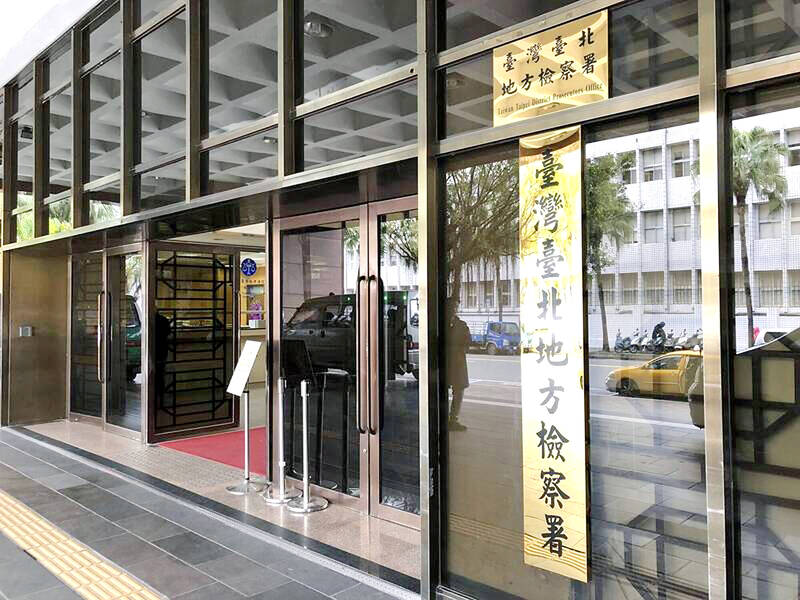Two Taiwanese were given three years deferred prosecution for their roles in helping two leading Chinese tech companies operate illegally in the country, the Taipei District Prosecutors’ Office said.
The two men, surnamed Doong (董) and Chang (張), had admitted wrongdoing and were handed deferred prosecution as part of their settlements reached with prosecutors, a court document issued on Tuesday showed.
As part of the agreements, Doong and Chang were handed penalties of NT$500,000 (US$16,124) and NT$300,000, while the two companies Doong had established in Taiwan — CXMOS and Tenafe Taiwan Technology Ltd — were ordered to make payments of NT$500,000 and NT$300,000 into the national coffers.

Photo: Taipei Times
Doong worked as an assistant manager at Wuhan-based Yangtze Memory Technologies Co (YMTC, 長江存儲) — a Chinese semiconductor integrated device manufacturer specializing in flash memory chips — from 2016 to 2019, the prosecutors said.
In November 2017, under that company’s instruction, Doong set up CXMOS in Taiwan, imported chip samples from YMTC and interviewed people in Taiwan for sales positions, in a bid to explore business opportunities in the nation, prosecutors said.
Doong was also accused of establishing and running Tenafe Taiwan Technology Ltd in May 2019, a subsidiary of Tenafe Beijing, which shipped semiconductor components, printed circuit boards and chips from its headquarters to be used as samples and for testing, as a way to boost the Beijing company’s sales in Taiwan.
Chang took over Doong’s position at Tenafe Taiwan in June 2021 and interviewed more than 30 engineers, prosecutors said.
It was found that about NT$500 million from YMTC and Tenafe Beijing had been indirectly channeled into CXMOS and Tenafe Taiwan’s bank accounts to boost funds available to them, the prosecutors said.
They said they believed Doong and Chang’s actions had breached Article 40-1 of the Act Governing Relations Between the People of the Taiwan Area and the Mainland Area (臺灣地區與大陸地區人民關係條例).
The clause says that an enterprise from China or an enterprise it invested in a third area cannot “engage in any business activities in Taiwan” unless it is “permitted by the competent authorities and has established in the Taiwan Area a branch or liaison office.”
The penalty cited for violating Article 40-1 is up to three years in prison and/or a fine of up to NT$15 million.

Taiwan is stepping up plans to create self-sufficient supply chains for combat drones and increase foreign orders from the US to counter China’s numerical superiority, a defense official said on Saturday. Commenting on condition of anonymity, the official said the nation’s armed forces are in agreement with US Admiral Samuel Paparo’s assessment that Taiwan’s military must be prepared to turn the nation’s waters into a “hellscape” for the Chinese People’s Liberation Army (PLA). Paparo, the commander of the US Indo-Pacific Command, reiterated the concept during a Congressional hearing in Washington on Wednesday. He first coined the term in a security conference last

Prosecutors today declined to say who was questioned regarding alleged forgery on petitions to recall Democratic Progressive Party (DPP) legislators, after Chinese-language media earlier reported that members of the Chinese Nationalist Party (KMT) Youth League were brought in for questioning. The Ministry of Justice Investigation Bureau confirmed that two people had been questioned, but did not disclose any further information about the ongoing investigation. KMT Youth League members Lee Hsiao-liang (李孝亮) and Liu Szu-yin (劉思吟) — who are leading the effort to recall DPP caucus chief executive Rosalia Wu (吳思瑤) and Legislator Wu Pei-yi (吳沛憶) — both posted on Facebook saying: “I

Sung Chien-liang (宋建樑), who led efforts to recall Democratic Progressive Party (DPP) Legislator Lee Kun-cheng (李坤城), was released on bail of NT$80,000 today amid outcry over his decision to wear a Nazi armband to questioning the night before. Sung arrived at the New Taipei District Prosecutors’ Office for questioning in a recall petition forgery case last night wearing a red armband bearing a swastika, carrying a copy of Adolf Hitler’s Mein Kampf and giving a Nazi salute. Sung left the building at 1:15am without the armband and covering the book with his coat. Lee said today that this is a serious

The Ministry of Economic Affairs has fined Taobao NT$1.2 million (US$36,912) for advertisements that exceed its approved business scope, requiring the Chinese e-commerce platform to make corrections in the first half of this year or its license may be revoked. Lawmakers have called for stricter enforcement of Chinese e-commerce platforms and measures to prevent China from laundering its goods through Taiwan in response to US President Donald Trump’s heavy tariffs on China. The Legislative Yuan’s Finance Committee met today to discuss policies to prevent China from dumping goods in Taiwan, inviting government agencies to report. Democratic Progressive Party Legislator Kuo Kuo-wen (郭國文) said